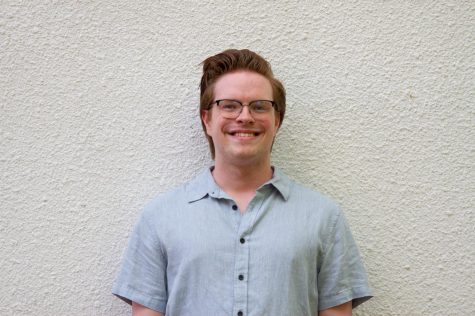Student body presidential candidates face off
UW-Eau Claire elections will occur Sept. 16-18
Photo by Submitted
UW-Eau Claire Student Senate student body presidential elections will commence Sept. 16-18.
Note: Joel Meier is an active member of The Spectator. The Spectator is a bipartisan publication and therefore is not affiliated with the Buttafouco/Meier campaign.
Anna Ziebell, a fourth-year political science student, is running for president alongside vice presidential candidate Joe Murphy, a fourth-year information systems student.
Running against this pair is Jackie Buttafuoco, a fourth-year biology student, alongside vice presidential candidate Joel Meier, a third-year marketing analytics student.
The election for student body president at UW-Eau Claire will be held September 16-18.
The candidates faced off last Wednesday in a debate, during which they were asked ten questions concerning their platforms. These questions tackled different critical issues, in addition to their qualifications for the position of president and vice president of the student body.
This debate was streamed live online and can still be viewed on the UW-Eau Claire Student Senate’s facebook page.
In their opening statement, Buttafuoco and Meier said that their platform was based on four key missions.
The first was reimbursing student dollars to help students with the financial impact of the COVID-19 pandemic.
They also said they want shared discussions to take place with students and administration before important decisions, to connect the campus community through educational resources and to advocate for accountability from university administration.
In Ziebell and Murphy’s opening statement, they listed the pillars on which they are basing their campaign’s platform, which are equity and advocacy, sustainability, transparency, accountability and student housing.
They stressed the importance of accountability from themselves as student senators, as well as administration.
“We feel as though we need to be held accountable for the actions that we pursue, as well as holding administration accountable,” Ziebell said.
They also discussed the importance of students knowing their rights when they deal with leases and landlords for both off and on-campus housing.
The candidates were first asked to describe their experiences and qualifications that they believe will make themselves successful as president and vice president.
Buttafuoco said she and Meier had previously led a student coalition to attempt an open dialogue with the chancellor, while also creating the Coalition Against Sexism and Misogyny at UW-Eau Claire.
She has shown in other involvements on campus, along with her previous experience as a student senator, that she is capable of “bringing voices to the table,” Buttafuoco said.
Meier said that he is involved in student journalism, business organizations and in student government, which has allowed him to see the campus from many different perspectives.
“We only have a limited amount of experience and that’s why we want to utilize everyone,” Meier said.
Ziebell spoke about her and Murphy’s cumulative six years of experience in the student senate, and her previous role as the student body vice president last year.
Murphy spoke about his experience with working at the Learning and Technology Services Help Desk and on the finance committee — which allowed him to learn about the university’s budget.
“I think Anna and I have a beautiful kind of yin and yang of background and experience,” Murphy said.
The candidates were asked about their top priorities if elected and how they planned to achieve them amidst the unusual circumstances the university faces due to the COVID-19 pandemic.
Murphy stressed the importance of all information and resources from the student senate being available to the student body online.
Buttafuoco spoke about the partnership’s desire to study the university’s general operations budget, in order to locate funds that can be directly reallocated to projects helping students.
When asked about what is lacking right now in terms of communication with student groups, both sides emphasized the need to improve communication between student government and the student body.
“One issue we really saw last year was that there was a large information silo,” Meier said. “(With) administration and the top of the student senate maintaining all information and dispersing very little of it to general students and to the student senators,” Meier said.
Ziebell spoke about the student senate utilizing Blugold Connect to directly communicate with student organizations.
Concerning shared-governance, Ziebell commented that it is not required for the chancellor to consult with the student body president and representatives. It is critical that the student senate is able to collaborate well with university administrators.
Meier said that they want to expand the access to this knowledge far beyond the student senate.
The candidates were also asked about how they view the current campus climate and what improvements can be made.
“It is absolutely essential that we are protecting students of color and students with other marginalized identities in the discussions and in the work that student senate does,” Ziebell said.
Buttafuoco emphasized the importance of members of the student body speaking up if they witness abuse from other students or university staff.
When asked how they plan to allow the student body to hold themselves accountable, both sides stressed the importance of transparency and direct communication with the student body.
Buttafuoco said she plans to do frequent livestreams online to converse with fellow students, and Murphy said he wants to communicate with as many different students and organizations as possible.
The candidates were asked how they plan to work with the campus police to work with Equity, Diversity and Inclusivity goals.
Buttafuoco said she would like to restructure the way crimes that disproportionately affect minorities and impoverished communities are handled, specifically marijuana violations, underage alcohol violations and parking tickets.
Murphy acknowledged that the university is lucky to have a campus police force instead of having to deal with the city police and that he knows the individuals on this police force want to build relationships with the students they protect.
Finally, the candidates were asked to name their top three issues currently facing members of the student body.
Ziebell and Murphy’s top three were health and safety with COVID-19, social justice movements like Black Lives Matter and concerning police brutality and properly allocating the budget.
Buttafuoco and Meier’s top three were lack of a sense of security on campus, the student body having a lack of information and improving community involvement.
Janssen can be reached at [email protected].

Sam Janssen is a fourth-year journalism student with a psychology minor. This is his fifth semester with The Spectator. In his free time, he enjoys being an avid sports fan and playing the guitar.











